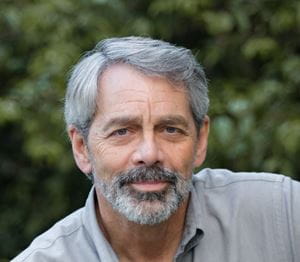
Dave Evans is best known for being the co-founder of Stanford Life Design Lab and co-author of Designing Your Life, Designing Your Work Life. While his work with the electronic arts is impressive, so is his determination to help people find their meaning and purpose in life. Throughout his career, he has had a desire to integrate faith.
In the below interview, we asked Mr. Evans to turn inwards and discuss what faith means to him. How does he see himself within the scope of religion? He also dove into what he believes faith is today in our world and answers how believers different than others.
I would describe myself as…
A follower in the way of Christ.
The common moniker is “Christian,” but the term just does not work anymore. In fact, “Christian” was a slang label (really a slur) slapped onto the early followers by the Romans. So, the term has a checkered past in the long, long history of faulty labeling.
While names may not matter that much, the underlying reality they refer to does. In this way, being “a Christian” differs in my view substantially from being “a follower of Christ.” Christian is a noun, a thing, a (too often) static specification. Most people think what defines being one is what you believe, a set of ideas. That is not it. Quickly – scan the new testament and find all the scenes where Jesus is tutoring the disciples on updating their Statement of Faith document for theological correctness (Do not bother – there are none). Follower is different. Following is a behavior, an action, a doing, not a thinking. Christianity is supposed to be a “way,” which only makes sense as a lived experience, a practice, a life. The test of christianness should not be “what do you believe” but “what is your life.” While I think a lot about ideas and my ideas about God have grown and changed dramatically over the last 50+ years of my limp attempt at following, my faith first and foremost are not ideas.
Faith is…
An old adage says that “God often comes to us disguised as our life.” I would agree.
If God comes to us in the fabric of our lives, then faith – a life lived in a “way” that acknowledges and collaborates with God – would naturally be how we come to God, the world, and one another, in our life.
Faith is living actively into the hope that the way we see, encounter, and hope for things in those moments when we experience the divine sincerely and authentically (which may or may not be happy or much fun, by the way) is the trustworthy and reliable way to live all the time. My wife describes her faith as “the unreasonable goodness and light program.” By “unreasonable,” she does not mean silly or ungrounded. She means despite strong but uncompelling evidence to the contrary.
In talking with a dear atheist friend of mine, I offered to him that the only real difference between us was what we do with mystery. This is a thinking, sensitive, deeply human atheist (vs. a hard-shelled, nihilistic, materialist atheist). He acknowledges experiences that can only be classed as mysteries. He thinks that unless those mysteries can only be explained by the existence of a divine reality (God), he’s intellectually and morally obligated to conclude that it’s not-God and is just some yet-to-be-discovered-un-God-thing.
I say he is rounding down on mystery. I am rounding up. I look at my experience of mystery (reassurance when it makes no sense; beauty that suddenly transcends everything and announces the unity of all creation; a bodily experience of being indwelt by unconditional and searingly true love from beyond myself or any person – that kind of stuff) and am at peace naming those things as being from and of God. I must say that my friend wrestles a bit at my over-simplification that atheists are rounding down on mystery, and believers are rounding up. But it works for me, and I do think gets at the essence of the thing.
Faith is the process of trying to put yourself in a “thin place” all the time. The Celts had a deeply embodied spirituality. They were on the lookout for the divine all the time and came to identify special places – actual locations – where the Spirit was more accessible. They called these thin places – places where heaven was a little closer to earth, and God was nearer. My experience of God doesn’t depend on hotspot locations. I understand walking in faith to be relying on a particular way of being in the world (back to that “a way” vs. “a thing”) as a means to working at being in a thin place as near to all the time as you can.
Jesus said that the kingdom of God was already here. Moses said it is so near to you, it’s in your mouth. So… I am just trying to walk in the way those promises invite.
11/3/2020 7:03:36 PM




